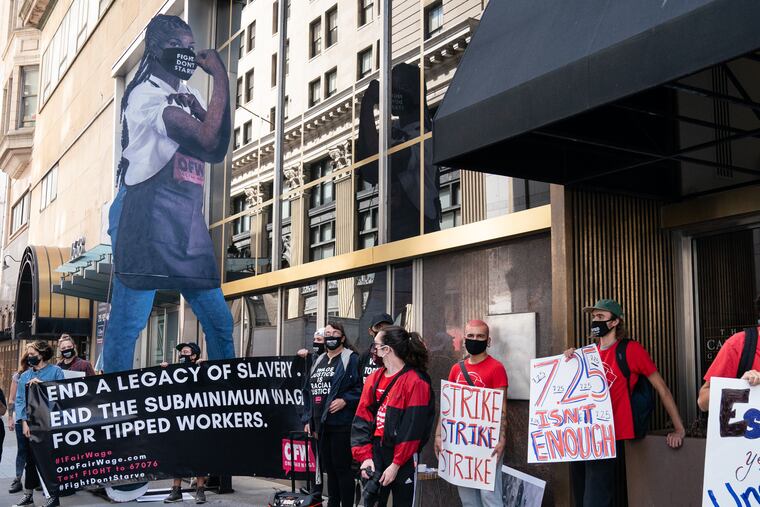As workers grow desperate, Pa. lawmakers launch nation’s ‘most expansive minimum wage bill’
The One Fair Wage bill would guarantee a minimum hourly wage not just for restaurant workers, but also for gig workers, for incarcerated people, and for people with intellectual disabilities.

Carrie Schweitzer started working as a diner waitress when she was a teenager, making $2.45 an hour. Three decades later, at age 47, her pay has barely budged, to $2.83 plus tips. Even working a 40- or 50-hour week, she makes so little she qualifies for food stamps.
Still, Schweitzer, of Northeast Philadelphia, was used to it — until the pandemic brought her to the brink of crisis.
“COVID opened my eyes,” she said. “It was impossible to save for six months of shutdowns.”
So, on Wednesday afternoon, she joined the advocacy group One Fair Wage for a small but loud protest that began outside the Capital Grille and wound through Center City’s restaurant district, calling for a $15 minimum wage and protections for workers. They were joined by Democratic state lawmakers, who on Wednesday introduced a One Fair Wage bill that would guarantee a minimum hourly wage not just for restaurant workers, but also for gig workers, incarcerated people, who currently earn as little as 19 cents per hour, and people with intellectual disabilities in sheltered workshops that may pay just a few dollars an hour.
» READ MORE: Philly restaurant workers are organizing for higher wages and better work conditions despite the pandemic
State Rep. Chris Rabb, a Democrat from Northwest Philadelphia, called it the “most expansive minimum wage bill in the country.” He and State Sen. Art Haywood, who introduced a similar bill in the Senate, acknowledged that the bill was unlikely to advance unless Democrats take control of the legislature.
But they called it a moral imperative, citing a legacy of tipped work that traces back to Reconstruction-era employers unwilling to compensate formerly enslaved people. And they said it’s a matter of equity: 70% of tipped workers are women, and people of color are disproportionately in lower-paying restaurant jobs.
“Systemic racism is $2.83 an hour,” Haywood said.
Den D’Ariano, a bartender at the Fishtown pub Kraftwork who has not worked since March, held a homemade sign that read, “Bartenders 4 a Living Wage.”
“We cannot survive off of $2.13 an hour, especially during a pandemic,” they said. “In coronavirus, we were making no money at all from unemployment.”
The protesters gathered with banners and a towering cutout of “Elena the Essential Worker” — a distant cousin to Rosie the Riveter — outside the Center City power lunch spot because One Fair Wage is suing its parent company, Darden Restaurants. The lawsuit alleges wage discrimination by Darden, which runs 1,500 restaurants under brands including Olive Garden, Seasons 52, Yard House, and LongHorn Steakhouse.
One Fair Wage claims that the tipped work policy there exposes women to sexual harassment from customers and staff. And it points to a study that found white workers are tipped on average 1.49% more than Black workers, to show disparate financial harm.
A Darden spokesperson said those allegations are baseless and the protest is misplaced. Darden says its tipped workers earn on average $20 an hour, and Capital Grille employees take home $41.42.
Still, some employers are embracing the One Fair Wage model as more equitable than tipped work, even if the potential take-home pay is lower. One is Paul Zelinsky, who was the chef at Jaxon BYOB in Northern Liberties and is preparing to reopen the restaurant as Kenslove BYOB.
“Everyone in my restaurant, we all make the same because we all work the same: Everyone makes $15 an hour,” he said.
Schweitzer, who did not want to name the diner where she works, said even when tips are good, workers’ take-home pay is eroded in ways that often go unseen. She has to “tip out” bussers, bartenders, and expeditors 25% of what she receives from customers. And she has to clock out after 35 hours a week, preventing her from receiving overtime or health coverage.
Over the years, she couldn’t pay for child care. “I can’t tell you how many times I had to bring my son to work with me, sitting in that back booth while I work and he colored.” Now, her son also works in food service. They share an apartment because neither can afford to live alone.
Still, when she invited her coworkers to protest, they refused.
“Many of them would not come because they are comfortable with the conditions we have learned to live with. Others are too afraid to lose their jobs,” she said.
She’s afraid of that, too, but said she had to speak up: “My son has followed me into the restaurant business, and I have to make sure the conditions are better for him.”